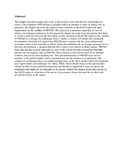| dc.contributor.author | Wanyande, Peter | |
| dc.date.accessioned | 2013-05-02T07:11:33Z | |
| dc.date.available | 2013-05-02T07:11:33Z | |
| dc.date.issued | 2004 | |
| dc.identifier.citation | In Makumi Mwagiru (edit) African Regional Henrich Boll Foundation Regional Office for Eastern Africa, Nairobi | en |
| dc.identifier.uri | http://archive.uonbi.ac.ke/print_activities/publication-details.php?dept_code=EH&fac_code=&publication_id=11507 | |
| dc.identifier.uri | http://erepository.uonbi.ac.ke:8080/xmlui/handle/123456789/18215 | |
| dc.description.abstract | This chapter provides insights into some of the security issues that the new partnership for Africa’s Development (NEPAD) has to grapple with as it attempts to make its impact felt. In particular, the chapter discusses the major security concerns in the IGAD region and their implications for the viability of NEPAD. This discourse is necessary especially in view of Africa’s development initiatives. In this regard the chapter proceeds from the premise that there is a close connection between the prevailing security situation in the IGAD region as the viability of NEPAD as a strategy for enhancing Africa’s ability to realize self-reliant and sustainable development. Secondly it is argued that NEPAD must contend with the socio-political and economic reality in the continent as whole. Africa has relied heavily on foreign assistance for it s previous development, a situation that has led to what is now known as donor fatigue. NEPAD must take this into account especially in view of the central role that external development partners are envisaged to play in NEPAD.The continent is also known more for its internal conflicts and poverty than anything else. The operationalization of NEPAD must also be attentive to the global realities such as globalisation and the collapse of communism. The collapse of communism led to an unchecked hegemony of the West. Both of these developments pose opportunities and challenges for Africa. While Africa should focus on the opportunities offered by these recent global developments and should be supported, it must not ignore the challenges that might act as constraints to its success. Finally the chapter posits that security in the IGAD region is a function of the nature of governance, hence the need first to deal with governance issues in the region | en |
| dc.language.iso | en | en |
| dc.title | NEPAD and security In the IGAD region.Security in the age of globalization. | en |
| dc.type | Article | en |
| local.publisher | Department of Political Science, University of Nairobi | en |

